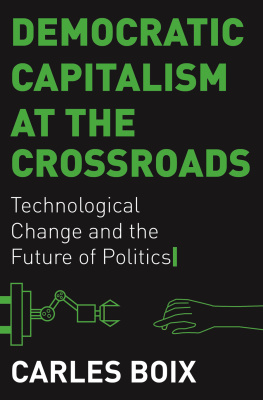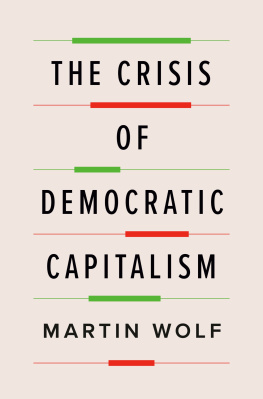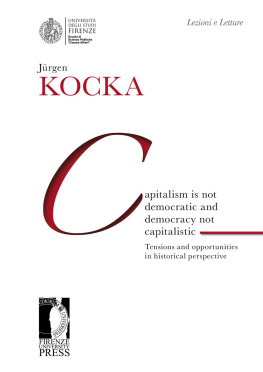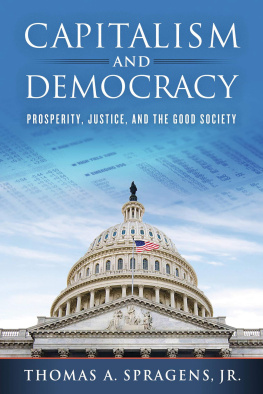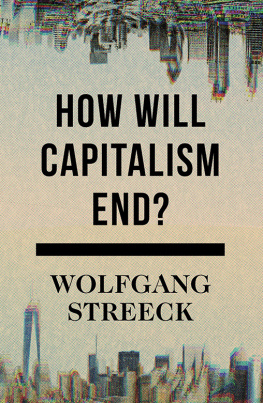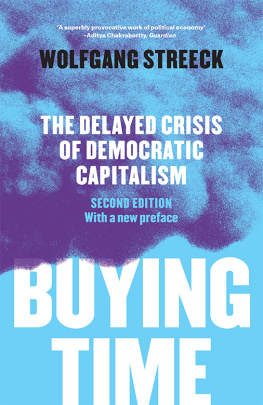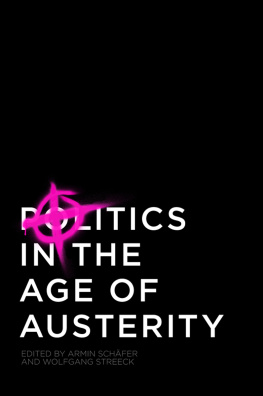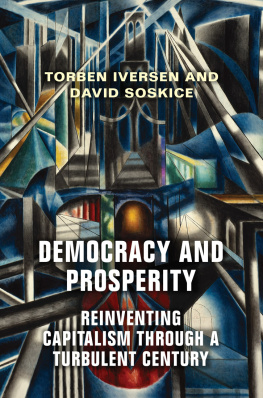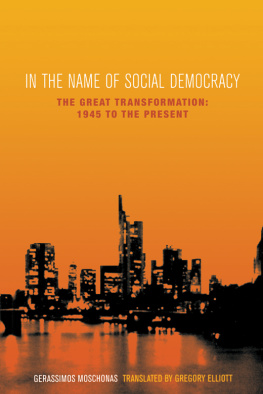
DEMOCRATIC CAPITALISM
AT THE CROSSROADS
Democratic
Capitalism
at the Crossroads
Technological
Change and the
Future of Politics
Carles Boix
PRINCETON UNIVERSITY PRESS
PRINCETON AND OXFORD
Copyright 2019 by Princeton University Press
Published by Princeton University Press
41 William Street, Princeton, New Jersey 08540
6 Oxford Street, Woodstock, Oxfordshire OX20 1TR
press.princeton.edu
All Rights Reserved
Library of Congress Control Number: 2019930187
ISBN 978-0-691-19098-3
British Library Cataloging-in-Publication Data is available
Editorial: Eric Crahan, Bridget Flannery-McCoy, Pamela Weidman,
and Alena Chekanov
Production Editorial: Jenny Wolkowicki
Jacket design: Layla Mac Rory
Production: Erin Suydam
Publicity: Tayler Lord and Caroline Priday
Copyeditor: Maia Vaswani
This book has been composed in Adobe Text Pro
Printed on acid-free paper.
Printed in the United States of America
10 9 8 7 6 5 4 3 2 1
To Carles, Enric, and Mart
CONTENTS
ACKNOWLEDGMENTS
This book grew out from my teaching a semester-long seminar on The Politics of the Future (later on renamed Democratic Capitalism at the Crossroads) to students at the Woodrow Wilson School of Public and International Affairs in Princeton for several years. I am grateful to all of them for their good-humored willingness to engage with and challenge the readings we explored together. They provided me with a splendid venue to probe the ideas that I have eventually developed here. I also wish to acknowledge the support I received from the Princeton Institute for International and Regional Studies to run a monthly talk series on the Future of Capitalism where we enjoyed thought-provoking conversations with top scholars and practitioners on how our political and economic future may look.
The current text, either some of its chapters or in its entirety, has been presented in seminars at Harvard University, the Institutions and Political Economy Research Group (IPERG) at the University of Barcelona, MIT, Oxford University, Texas A&M University, Universidad Carlos III, the University of Nottingham, and Yale University. I thank all the participants for their comments, especially Alcia Adser, James E. Alt, Cesc Amat, Benjamin Armstrong, Pablo Beramendi, Elissa Berwick, Pradeep Chhibber, Peter Hall, Dani Rodrik, David Stasavage, and Kathleen Thelen. Pau Vall provided invaluable research assistance. I completed the manuscript during a sabbatical year at the University of Barcelona partly funded by the European Research Council under the European Unions H2020 Program.
DEMOCRATIC CAPITALISM
AT THE CROSSROADS
Introduction
Politics in democratic countries is today in a state of turmoil. Trust in national institutions has reached a historical low. In advanced industrial economies, slightly over one in three people express confidence in their governments. Only twenty percent of Americans think that politicians care about their opinionsa number sharply down from almost four in five in the late 1950s. In France, Germany, and the United Kingdom, the proportion is even lower, at around ten to fifteen percent. Such a wave of disaffection has, in turn, given way to growing disengagement from traditional party politics. In Western Europe, electoral abstention has doubled since the 1970s, mainly among the youngest cohorts. Among those electors who vote, close to one-quarter are casting their ballots for far-right and far-left parties. Populist and nationalist alliances now govern a handful of European countries. And, in a context of increasingly polarized politics, in 2016 close to half of American voters elected a president intent on challenging, if not overturning, the very liberal democratic order of global cooperation and open economies that the United States designed and built after World War Two.
Not coincidentally, those political trends follow a set of momentous economic transformations across the world. Since the 1980s, the invention of the personal computer and, more generally, of modern information and communication technologiesas well as the globalization of trade and the offshoring of production, which have been fostered by those technological advanceshave reshaped both the workplace and the overall structure of the labor market, intensifying the demand for highly educated individuals in the advanced world and the employment of manufacturing workers in emerging economies while reducing the number of blue-collar and white-collar jobs in North America and Europe. Salaries have behaved likewise. Over the two decades preceding the last Great Recession of 2007, the (household) per capita income of the richest ten percent in advanced economies rose more than sixty percent in real terms (that is, once we take into account changes in prices). The urban and rural middle strata of China and Southeast Asia saw their income grow by almost eighty percent in the same period. By contrast, the income of the bottom half of the income distribution in countries like Germany, Japan, and the United States has remained flat for close to four decades.
There is nothing to indicate that those economic transformations or the political turbulence that accompanies them will stop in the near future. If anything, the pace of technological and employment change may accelerate in the next few decades. According to some recent estimates, almost half of all current jobs may end up being automatized in the next twenty to thirty years. Most of that substitution by computer algorithms and robots will first affect the least qualified individuals. But it may not be limited to them, hitting, at some point in time, relatively creative, nonroutine jobs that today still appear hard to robotize.
Unsurprisingly, the extent and consequences of automation have become the object of a heated debate in the academic and political arenas. Technological pessimists foresee a brave new world where, once artificial intelligence makes its final breakthrough into the so-called singularity moment, workers will become completely redundant or will draw, at most, a meager salary. Sitting at the top of a mass of unemployed and underemployed individuals, there will be a small creative classa thin layer of inventors, top managers, and highly educated professionalsenjoying the benefits of automation and globalization. The system of democratic capitalism that has so far prevailed in the advanced world will crumble under the weight of so much economic inequality. Policy makers will not be able to reconcile free markets with representative elections and deliver both economic growth and a generous welfare state in the way they did during the better part of the twentieth century. The new technologies of information and communication invented in Silicon Valley will take us back to the contentious politics of nineteenth-century capitalism, finally vindicating Karl Marx, who, more than 150 years ago, predicted the eventual substitution of machines for workers, the immiserization of the masses, and the collapse of capitalism at the hands of a horde of angry men, armed with pitchforks and torches, marching down on the wealthy fewnow huddled in their Manhattan and Bay Area mansions.
On the other side of the aisle, technological optimists concede that automation will disrupt the labor market and hurt the wages of the least educated, alienating them from politics and elections. Yet, they contend, those costs will be temporarythe transitory pangs associated with the birth of any new technological and social order. In due time, an overabundant economy will free the great majority or even all of us from both the bondages of work and ruthless interpersonal competition, and allow humankind to hunt in the morning, fish in the afternoon, and read poetry after dinner.
Next page
